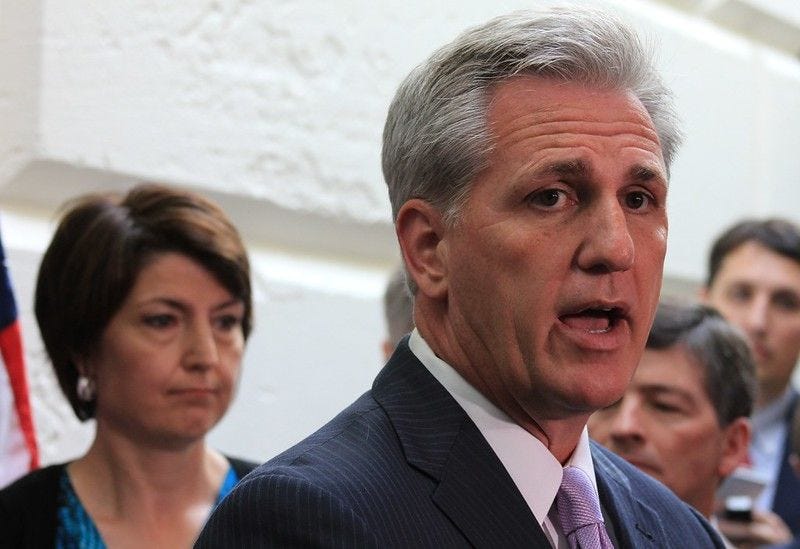Will McCarthy pull it off?
After seeking the House speakership for years, Kevin McCarthy is closer than ever. But he still doesn’t have the 218 votes he needs.
Good morning! It’s Tuesday, January 3, 2023. The 2024 elections are 672 days away.
📣 If this newsletter was forwarded to you, subscribe here. If you want to contribute to support my work, donate here.
Will Kevin McCarthy win the speakership?
For most of his adult life, Kevin McCarthy has had his eyes trained on a singular goal: winning the House speakership.
He first arrived in Washington in 1987, when Tip O’Neil’s legendary run as speaker was coming to a close, as a 22-year-old aide to then-California Rep. Bill Thomas. (A moderate Republican, Thomas now calls his protégé McCarthy a “hypocrite” who is willing to lie in order to gain power.)
When Thomas retired in 2006, McCarthy — by then the Republican leader in the California state assembly — won his seat. He quickly rose up the leadership ranks in Washington: chief deputy whip at age 43, majority whip at age 45, majority leader at age 49.
In 2015 came McCarthy’s first opportunity to grab the speaker’s gavel, when conservative members of the House Freedom Caucus pushed then-Speaker John Boehner into retirement. But McCarthy was deemed insufficiently conservative as well and had to step aside for Paul Ryan. (In an era before the January 6th committee, McCarthy was also hurt by acknowledging the political upside of a congressional investigation, the ongoing Benghazi probe.)
After leading House Republicans back into the majority in November, McCarthy now arrives at his best chance yet to seize the speakership. He is so close that his belongings have even been moved into the speaker’s office — but McCarthy himself acknowledges that he doesn’t yet have the 218 votes needed to guarantee he’ll stay there.
Sometimes mocked by journalists for not having the most sophisticated policy chops, McCarthy’s juice in Washington isn’t derived from his mastery of issues: it’s from his mastery of relationships. He’s known for remembering every House Republican’s birthday, each of their children, even their dog’s name and their preferred Starburst flavors.
The ultimate test of those relationships will come today, as McCarthy will discover whether the prize he’s sought for years will finally become his — or whether it will slip away from his grasp once again.
Anatomy of the House GOP
When the 118th Congress gavels in at noon, there will be 222 Republican members of the House — meaning McCarthy can only afford to lose four votes to win the speakership, assuming all members vote for someone and all Democrats vote against him. Here’s a breakdown of the factions and factors driving today’s vote:
— The Never Kevins: There are two main groups of Republicans who have signaled plans to oppose McCarthy. Five Republicans are seen as firm “Never Kevins,” just enough to deny him the speakership: Reps. Andy Biggs (AZ), Matt Gaetz (FL), Bob Good (VA), Ralph Norman (SC), and Matt Rosendale (MT). This bloc is expected to vote for Biggs for speaker, at least on the first ballot.
Then there is another group of nine, including Freedom Caucus chairman Scott Perry (R-PA), who have not pledged to oppose McCarthy — but seem pretty skeptical. They wrote in a letter on Sunday that McCarthy’s proposed rules package (outlined below) was “insufficient” and came “almost impossibly late to address continued deficiencies.”
— The Only Kevins: This is an odd group, by Washington standards. These are moderates who have declared themselves diehard McCarthy allies and said they won’t support anyone else for speaker, underlining the point by passing out buttons with the ringing endorsement “OK” (for “Only Kevin”).
The thing is, unlike their conservative counterparts, the moderates have staked out a position without asking anything for it, giving them little leverage in the speaker fight. They’ve watched as McCarthy has given concession after concession away to right-wing members — including some that likely make them uncomfortable — but all they have done is double down and said McCarthy is the only man who could win their support.
— The Kevin Converts: Here is the category with members like Marjorie Taylor Greene (R-GA) and Jim Jordan (R-OH), influential conservatives who have bucked their ideological bedfellows and backed McCarthy. Jordan was a key force behind blocking McCarthy from the speakership in 2015; McCarthy’s cultivation of him shows the Californian’s true strength in building relationships.
Both Greene and Jordan stand to gain handsomely if McCarthy pulls it off today: the former is poised to win a seat on the Oversight Committee, while the latter is about to become chair of the Judiciary Committee. (Former president Donald Trump, it should also be noted, has also endorsed McCarthy.)
— George Santos: This is the New York Republican’s first day in the House, so it’s not as if he holds much sway in the speaker’s vote. But I wanted to mention him to underline what he represents for McCarthy.
Santos, of course, has been uncovered for lying about nearly his entire résumé and is already under investigation by three prosecutor’s offices — plus authorities in Brazil. But even as some Republicans have criticized the New Yorker, McCarthy has remained studiously quiet. The votes of serial fabulists still count for speaker, after all — and McCarthy needs every vote he can get.
If McCarthy does become speaker, Santos-gate previews what will be his complete inability to ever speak out against his own members, for fear of losing their support — or their seat — in his slim five-member majority. This gives every House Republican maximum leverage to pursue their own course with little fear of punishment, and would make McCarthy a historically powerless speaker.
What McCarthy has given away
For other signs of McCarthy’s weakness heading into today’s vote, take a look at what he has given away. McCarthy’s proposed rules package for the next Congress, unveiled on Sunday, included several concessions to the “Never Kevins” — meeting many of their demands. Here are the key rules to know about:
Motion to vacate: Most notably, McCarthy caved on the “motion to vacate the chair,” a procedure that allows for a new speaker vote mid-session. McCarthy agreed to lower the threshold — something he said he would never do — so it would only take five Republicans joining the motion to trigger a full vote.
Biden investigations: McCarthy agreed to create a “Select Subcommittee on the Weaponization of the Federal Government,” which would investigate alleged abuses by a range of targets, from the FBI to Dr. Anthony Fauci.
Holman Rule: The package also restores a rule that allows Congress to cut the salaries of specific federal employees down to $1.
House operations: There are also a slew of changes to how the lower chamber operates, including an end to pandemic-era proxy voting, a requirement that members be given 72 hours to read any bill put up for a vote, and a reversal of the Democratic push to allow unions for House offices.
Importantly, it is not clear that any of those concessions have won McCarthy any support: after giving away quite a bit, he has still yet to publicly flip a single detractor from “no” to “yes.” After all this time in Washington, McCarthy is still negotiating from weakness, not from power.
How the vote will work
Something important to know about the speaker vote: it’s the first thing the House must do when a new Congress begins, and the House can’t do anything else until it’s done.
The vote will begin shortly after 12 p.m. Eastern Time. All 212 Democrats are expected to vote for incoming Minority Leader Hakeem Jeffries (D-NY). Assuming every member casts a vote, if McCarthy does not win support from 218 Republicans, there will be another ballot — and another and another, until someone wins 218. (If any members abstain by voting “present,” they don’t count towards a majority and McCarthy’s threshold is lowered.)
This process will continue until a speaker is named. Since members haven’t even technically been sworn in yet (that’s the next order of business), they can’t introduce or vote on bills until they’ve elected a speaker. Some insiders are expecting the voting to go on for hours, and possibly even days; although the House can’t move to other business, the chamber can adjourn between votes to give members time to huddle off the floor.
There are two ways this can go. If McCarthy doesn’t get to 218 on the first ballot, he could make more concessions to his critics: lowering the threshold for making a “motion to vacate” to just one member, for example. But if neither side caves in after several ballots, new candidates will begin to pop up.
Pay close attention to McCarthy’s No. 2, Steve Scalise (R-LA), who could present himself as an alternative if the vote drags on. The No. 4 member of leadership, Elise Stefanik (R-NY), could be another possibility. Rep. Don Bacon (R-NE) has even suggested that, if McCarthy falters, he and other moderates might team up with Democrats to propose a “unity speaker.”
It is hard to imagine a more chaotic start to the new Republican majority. This is a situation without precedent in the modern era: generally, it is a foregone conclusion that members of a new majority will support their party leader for speaker.
If today’s vote does go to a second ballot, it will be the first time that’s happened since 1923. But, as history shows, the voting will continue as long as it takes: the high watermark was in 1855, when it took two months and 133 ballots to crown a speaker. So buckle up.

Does any of this matter?
Discounting Don Bacon’s “unity speaker” scenario (which isn’t too likely), the next speaker of the House will almost certainly be a dyed-in-the-wool Republican, whether it’s Kevin McCarthy or Steve Scalise or someone else. So does today’s vote really matter?
Ultimately, although the House speakership comes with great power — they set the House agenda and sit second in line to the presidency — this is less about the person who ends up with the gavel than the chaotic process that is likely to bring them there. Remember: even if McCarthy ekes out the speakership, he will have done so under terms that will allow five Republicans to call a vote to fire him at will any time they please. So don’t expect the disorder to end with today’s vote.
At some point this year, for example, Congress will have to raise the debt ceiling to ensure that the U.S. can borrow enough money to meet its existing obligations. Failure to do so could very well crash the U.S. economy and result in a global financial crisis. If McCarthy is unable to round up the votes to win the speaker’s gavel, he will likely face difficulty whipping votes to raise the debt limit, which his same Republican critics have historically opposed doing. He could even face a “motion to vacate” if he does so.
While the speaker’s vote itself may not have grand consequences, the disarray expected to be on display today will serve as a preview of future chaos, which will extend to votes with very real policy consequences for the U.S. and the world.
🚨 What else you should know
➞ New Year’s Eve offered no reprieve for Ukraine as Russia continued to hammer the country with missile and drone attacks, killing more civilians. Ukraine also returned fire with one of its deadliest strikes against Russia yet, a blast in the Donbas region that killed 63 Russian soldiers.
➞ Two more changes on Capitol Hill to note: In her final days with the gavel, outgoing House Speaker Nancy Pelosi (D-CA) raised the maximum pay rate for House staffers from $203,700 annually to $212,100 — almost $40,000 more than the salary for House members. Lawmakers have struggled in recent years to compete with the private sector in retaining key staffers.
And: As Republicans move into the majority, House office buildings and the chamber’s public viewing gallery will reopen to visitors today for the first time since March 2020.
➞ And finally, a recommended read: “The Invention of Elise Stefanik,” an in-depth profile of House Republican Conference chair Elise Stefanik (R-NY) from the New York Times.

🗓 What your leaders are doing today
All times Eastern. Click on an event’s time to watch or listen to it.
Executive Branch
President Biden will receive his daily intelligence briefing (10:15 am). He has nothing else on his public schedule.
Vice President Harris will preside over the opening of the new Senate and administer the oath of office to all senators elected in November (12 pm). After the official swearing-in, she will then ceremonially swear-in senators individually with their families (1 pm).
White House press secretary Karine Jean-Pierre will hold her daily press briefing (2:30 pm).
Legislative Branch
The Senate will convene for a pro forma session, its last meeting for the 117th Congress (11:30 am). The chamber will then adjourn and gavel back in for its first meeting of the 118th Congress (12 pm).
After a prayer and the Pledge of Allegiance, certificates of election will be presented for each of the senators elected in November and they will be sworn in in groups of two. The chamber will then adopt a series of resolutions to organize itself for the new Congress, before the new senators are ceremonially sworn in individually.
The House will convene for its final meeting of the 117th Congress (10 am). The chamber will then adjourn and convene again later for its first meeting of the 118th Congress (12 pm).
After the prayer and pledge, the first order of business will be electing a speaker of the House. Assuming a speaker is elected today — no sure bet, as outlined above — all 435 members of the House will then be sworn in and the new rules package will be adopted.
If the speaker vote is settled early enough, the new House GOP majority also plans to vote on its first bill: the Family and Small Business Taxpayer Protection Act, which would rescind the $71 billion included in the Democrats’ Inflation Reduction Act to hire 87,000 new IRS employees.
Judicial Branch
The Supreme Court is out until Friday.
👋 Before I go...
Here’s a year-end piece I enjoyed: The New York Times rounded up some choice “facts that surprised, enlightened or entertained” in Times articles from across 2022. A few examples:
“In 1893, when the author Sir Arthur Conan Doyle temporarily killed off his iconic character, Sherlock Holmes, in an issue of The Strand Magazine, some 20,000 readers were so upset that they canceled their subscriptions.”
“At least 19 Indigenous groups are believed to still live without outside contact in the Brazilian Amazon’s Javari Valley.”
“Roughly one in three American adults have criminal records.”
“Humans spend about 35 minutes a day chewing, chimpanzees chew for about 4.5 hours a day and orangutans, about 6.6 hours.”
👍 Thanks for reading.
I get up each morning to write Wake Up To Politics because I’m committed to offering an independent and reliable news source that helps you navigate our political system and understand what’s going on in government.
The newsletter is completely free and ad-free — but if you appreciate the work that goes into it, here’s how you can help:
Donate to support my work or set up a recurring donation (akin to a regular subscription to another news outlet).
Buy some WUTP merchandise to show off your support (and score a cool mug or hoodie in the process!)
Tell your family, friends, and colleagues to sign up at wakeuptopolitics.com. Every forward helps!
If you have any questions or feedback, feel free to email me: my inbox is always open.
Thanks so much for waking up to politics! Have a great day.
— Gabe






